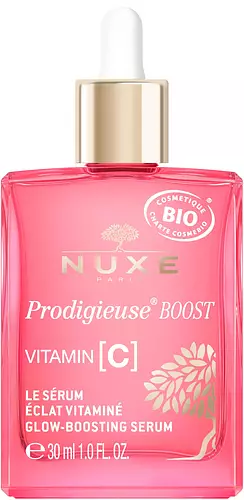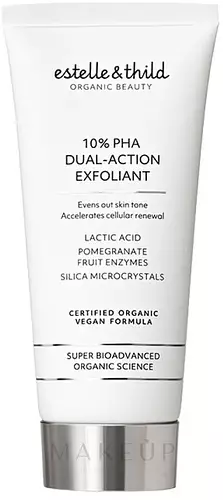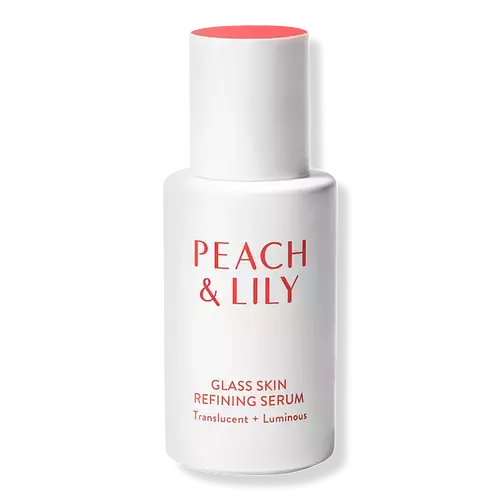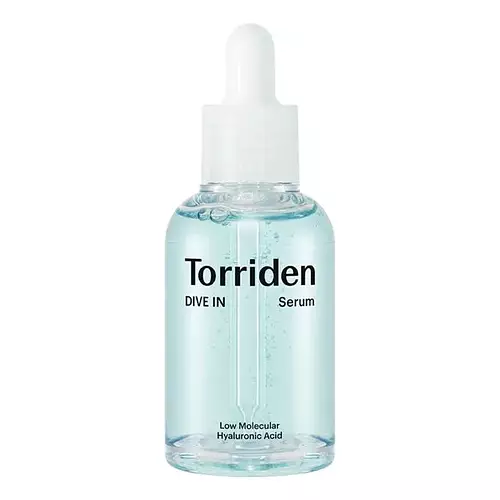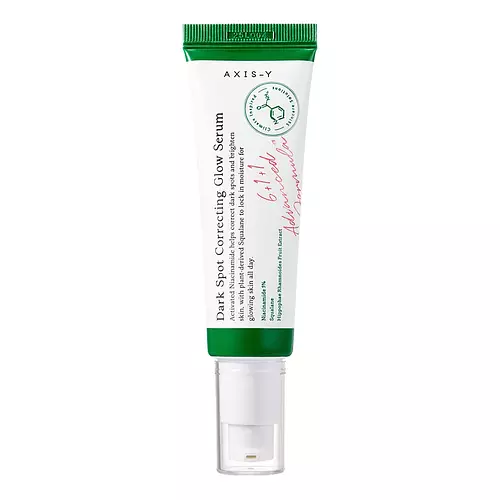
Estelle & Thild Super Bioadvanced 10% Vitamin-C Glow Booster Ingredients Explained
Updated on April 24, 2024 Submitted by starstellastar_407
Overview
What it is
Serum with 12 ingredients that contains hyaluronic acid and Vitamin C
Cool Features
It is vegan, cruelty-free, fungal acne (malassezia) safe, and reef safe
Suited For
It has ingredients that are good for anti aging, dry skin, brightening skin, scar healing, dark spots and better texture
Free From
It doesn't contain any harsh alcohols, common allergens, fragrances, oils, parabens, silicones or sulfates
Fun facts
Estelle & Thild is from Sweden. This product is used in 1 routines created by our community.
We independently verify ingredients and our claims are backed by peer-reviewed research. Does this product need an update? Let us know.
Serum with 12 ingredients that contains hyaluronic acid and Vitamin C
Quick info
You should know
Notable Ingredients
This product contains 1 ingredient that may have this attribute:
This product contains 1 ingredient that may have this attribute:
Benefits
This product contains 1 ingredient that may have this attribute:
This product contains 1 ingredient that may have this attribute:
This product contains 1 ingredient that may have this attribute:
This product contains 1 ingredient that may have this attribute:
This product contains 1 ingredient that may have this attribute:
This product contains 1 ingredient that may have this attribute:
This product contains 2 ingredients that may have this attribute:
Ingredients 12
Water. It's the most common cosmetic ingredient of all. You'll usually see it at the top of ingredient lists, meaning that it makes up the largest part of the product.
Ascorbyl Glucoside is a stable form of Vitamin C. It is created by combining glucose from starch.
Pentylene glycol is typically used within a product to thicken it. It also adds a smooth, soft, and moisturizing feel to the product. It is naturally found in plants such as sugar beets.
Glycerin is already naturally found in your skin. It helps moisturize and protect your skin.
Sodium Hydroxide is also known as lye or caustic soda. It is used to adjust the pH of products; many ingredients require a specific pH to be effective.
Sodium Hyaluronate is hyaluronic acid's salt form. It is commonly derived from the sodium salt of hyaluronic acid.
Lactobacillus Ferment is created by fermenting the Lactobacillus bacteria. It helps keep our skin's natural barrier and microbiome healthy.
Lactobacillus is a type of bacteria. It makes up most of the food fermenting lactic acid bacteria. It is used to create wine, yogurt, cheese, sauerkraut, pickles, beer, cider, kimchi, cocoa, kefir.
Cocos Nucifera Fruit Extract comes from the meat of the coconut fruit. It is an emollient and skin conditioner with antioxidant properties.
This is the synthetic salt of gluconic acid, a form of PHA and mild exfoliant.
Ingredient Ratings
Based on the number of likes and dislikes each ingredient has received.
Ingredients Explained
Water. It's the most common cosmetic ingredient of all. You'll usually see it at the top of ingredient lists, meaning that it makes up the largest part of the product.
So why is it so popular? Water most often acts as a solvent - this means that it helps dissolve other ingredients into the formulation.
You'll also recognize water as that liquid we all need to stay alive. Talk about multi-purpose! If you see this, drink a glass of water. Stay hydrated!
Learn more about WaterWe don't have a description for Malus Domestica Fruit Water.
Ascorbyl Glucoside is a stable form of Vitamin C. It is created by combining glucose from starch.
When applied to skin, Ascorbyl Glucoside turns into Ascorbic Acid.
Ascorbyl Glucoside is an antioxidant. Antioxidants help fight free-radicals, or molecules that may damage skin cells.
It can help to reduce redness, improve skin texture, reduce the effects of aging, reduce the visibility of dark spots, and brighten skin.
Read more about other types of Vitamin C:
Learn more about Ascorbyl GlucosidePentylene glycol is typically used within a product to thicken it. It also adds a smooth, soft, and moisturizing feel to the product. It is naturally found in plants such as sugar beets.
The hydrophilic trait of Pentylene Glycol makes it a humectant. As a humectant, Pentylene Glycol helps draw moisture from the air to your skin. This can help keep your skin hydrated.
This property also makes Pentylene Glycol a great texture enhancer. It can help thicken or emulsify a product. Emulsifiers help stabilize a product. It does this by preventing certain ingredients from separating.
Pentylene Glycol also acts as a mild preservative and helps to keep a product microbe-free.
Some people may experience mild eye and skin irritation from Pentylene Glycol. We always recommend speaking with a professional about using this ingredient in your routine.
Pentylene Glycol has a low molecular weight and is part of the 1,2-glycol family.
Learn more about Pentylene GlycolGlycerin is already naturally found in your skin. It helps moisturize and protect your skin.
A study from 2016 found glycerin to be more effective as a humectant than AHAs and hyaluronic acid.
As a humectant, it helps the skin stay hydrated by pulling moisture to your skin. The low molecular weight of glycerin allows it to pull moisture into the deeper layers of your skin.
Hydrated skin improves your skin barrier; Your skin barrier helps protect against irritants and bacteria.
Glycerin has also been found to have antimicrobial and antiviral properties. Due to these properties, glycerin is often used in wound and burn treatments.
In cosmetics, glycerin is usually derived from plants such as soybean or palm. However, it can also be sourced from animals, such as tallow or animal fat.
This ingredient is organic, colorless, odorless, and non-toxic.
Glycerin is the name for this ingredient in American English. British English uses Glycerol/Glycerine.
Learn more about GlycerinSodium Hydroxide is also known as lye or caustic soda. It is used to adjust the pH of products; many ingredients require a specific pH to be effective.
In small amounts, sodium hydroxide is considered safe to use. However, large amounts may cause chemical burns due to its high alkaline.
Your skin has a natural pH and acid mantle. This acid mantle helps prevent harmful bacteria from breaking through. The acid mantle also helps keep your skin hydrated.
"Alkaline" refers to a high pH level. A low pH level would be considered acidic.
Learn more about Sodium HydroxideSodium Hyaluronate is hyaluronic acid's salt form. It is commonly derived from the sodium salt of hyaluronic acid.
Like hyaluronic acid, it is great at holding water and acts as a humectant. This makes it a great skin hydrating ingredient.
Sodium Hyaluronate is naturally occurring in our bodies and is mostly found in eye fluid and joints.
These are some other common types of Hyaluronic Acid:
Learn more about Sodium HyaluronateLactobacillus Ferment is created by fermenting the Lactobacillus bacteria. It helps keep our skin's natural barrier and microbiome healthy.
Studies show lactobacillus ferment to be effective at repairing the skin barrier. Having a healthy skin barrier helps keep your skin healthy and hydrated. It also protects against bad bacteria.
As a probiotic/prebiotic/postbiotic, Lactobacillus ferment can help regular our natural biome. In fact, one study found a lack of diversity in our natural skin biome can trigger acne.
Learn more about Lactobacillus FermentLactobacillus is a type of bacteria. It makes up most of the food fermenting lactic acid bacteria. It is used to create wine, yogurt, cheese, sauerkraut, pickles, beer, cider, kimchi, cocoa, kefir.
Lactobacillus has antibacterial and antifungal properties (that's why we can eat the fermented foods above).
Lactobacillus is also skin conditioning and helps soothe the skin.
Read about lactobacillus ferment here.
Learn more about LactobacillusCocos Nucifera Fruit Extract comes from the meat of the coconut fruit. It is an emollient and skin conditioner with antioxidant properties.
Coconut fruit is naturally rich in amino acids, sugars, and nutrients including Vitamin C and small amounts of vitamin B. Malic acid can also be found in coconut fruit extract.
Aloe Barbadensis Leaf Juice Powder comes from the aloe plant.
You may know Aloe to be a good sunburn reliever and inflammation reducer. This is because it contains many components that are known to help reduce irritation and itchiness.
Aloe leaves are also great moisturizers. They are naturally rich in polysaccharides, a carbohydrate made of sugars. Polysaccharides are able to mimic the carbs found in the top layer of your skin. This can help keep your skin hydrated.
Aloe contains the antioxidants Vitamins A, C, and E. These vitamins neutralize free radicals. Free-radicals are molecules that may damage your skin cells, such as pollution.
Aloe does not protect against UV rays, despite it soothing sunburns.
Learn more about Aloe Barbadensis Leaf Juice PowderThis is the synthetic salt of gluconic acid, a form of PHA and mild exfoliant.
It is mainly used to stabilize oil and butter formulations from going bad. Sodium gluconate is a humectant, pH regulator, and chelating agent.
Chelating agents help neutralize unwanted metals from affecting the formulation.
Sodium gluconate is water-soluble.
Learn more about Sodium GluconateWhen to use
How this product is used by our community
Directions
Apply the booster 1-2 times daily on a cleansed face and follow up with a moisturizer. Allow the product to sink in before applying the rest of your skin care routine. Avoid contact with the eyes...
Apply the booster 1-2 times daily on a cleansed face and follow up with a moisturizer. Allow the product to sink in before applying the rest of your skin care routine. Avoid contact with the eyes when applying.
Compared With
Here are some products that it's often compared with
More Estelle & Thild Products
See all Estelle & Thild productsMore Serums
See all serumsWe're dedicated to providing you with the most up-to-date and science-backed ingredient info out there.
The data we've presented on this page has been verified by a member of the SkinSort Team.
Read more about us

